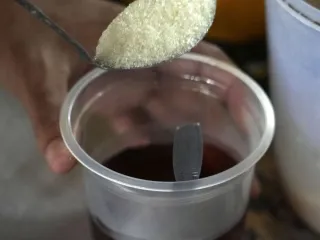On Nutrition
Do you feel like your sweet tooth is inversely proportional to the amount of sugar you eat? In other words, if you eat less sugar, you have less of a sweet tooth, but if you eat more sugar, you crave more? If so, you’re not alone—that’s something I hear a lot.
While I respect the truth of each person’s individual experiences, I also weigh those experiences against what is known from scientific evidence. Is one’s reality based on one’s perception, or on tangible physiological facts? Does science help explain their experience, or does it raise more questions?
For example, a 2024 review in the British Journal of Nutrition reviewed recent human research examining whether exposure to sweet foods or drinks affects how much we like sweet tastes (“our sweet tooth”). It turns out that studies of adults and children either found no link between sugar intake and subsequent sweet cravings or got results that were equivocal at best.
The authors noted that other research has found that how much we like sweetness varies from person to person, and that sweet “lovers” show an increase in liking when given increasingly sweet foods or drinks—until they eventually reach a plateau. On the other hand, sweet “dislikes” show a growing aversion to increasingly sweet foods and drinks.
So when someone thinks that the more sugar they eat, the more they crave it, what else can happen? One possibility is a rebound from restrictive eating. Forbidden food tastes sweeter, and this includes sweet foods. If you’ve been avoiding sugar and your control is cracking, you can quickly feel like having a little sugar leads to having a lot, and having a lot leads to having a lot more. It’s less about the sugar, per se, and more about the psychological response to restriction and deprivation.
Sometimes, emotional eating is the explanation. If you rely on food – especially sweet foods – to cope with big emotions, you can feel like your sweet tooth is out of control when you really need help developing other ways of coping. Or maybe you just have a habit of reaching for sugary foods, maybe when you’re having an afternoon energy slump or you’re bored, and what used to taste special is now just “normal,” so you need to up the ante.
Now, if you suspect you’re objectively eating too much sugar, should you do a 180 and try to abstain? Not enough. In part, this may set the stage for that rehashed food I just talked about, but also because not all sugar sources are created equal.
Vegetables, fruits, grains, legumes (beans and lentils), milk and other dairy products all contain natural sugars in different amounts, either in simpler forms (glucose, fructose, lactose) or as complex carbohydrates that our body breaks down into glucose. Natural sugars come as part of an intact, complete nutritional package of fiber, protein, vitamins, minerals, antioxidants and phytochemicals.
Added sugars are a different story. Added sugars include white sugar as well as sucrose, dextrose, maltodextrin, juice concentrate, and high fructose corn syrup that food manufacturers add to processed foods. They are highly refined and add calories without nutrients. And while “healthy” alternatives like honey, maple syrup, agave syrup, molasses, coconut sugar, or rice syrup may contain small amounts of the nutrient, it’s not enough to matter. In the end, all these sweeteners are refined and essentially the same, regardless of their original source.
The problem isn’t so much a teaspoon of sugar in your morning coffee or a freshly baked cookie. It’s more about the presence of added sugars in highly processed foods—even foods you probably wouldn’t add sugar to if you were making them from scratch at home. For some people, sugar-sweetened beverages are a major contributor to overall sugar intake and a good place to start making changes. The low-hanging fruit, so to speak.
One reason I don’t recommend trying to eliminate added sugar is that it can lead to obsession and make it difficult to participate in social gatherings that involve food. Social isolation is not good for health. But if you want to cut back on added sugar, there are gentler ways to do it. One is to rely less on prepared, packaged foods or to choose versions with less added sugar. Another is to use naturally sweet foods to reduce added sugar. If you are a sweet “lover”:
- Include fruit in your meals and snacks. Summer fruits that get sweeter as they ripen—such as apricots, peaches, nectarines, plums, and melons—are a particular treat.
- Bring out the sweetness of vegetables by roasting or grilling them. Caramelized onions—onions cooked slowly over low heat to extract their natural sugars and caramelize them—are especially delicious as a topping for burgers or grilled chicken.
- Add ripe bananas or chopped dates to quick bread, muffins or pancakes. This may allow you to cut some of the sugar in the recipe.
- Add overripe bananas or dried fruit to oatmeal – hot or overnight oats. This can also negate the need for additional sweeteners. The addition of cinnamon and vanilla also increases the perception of sweetness, although these flavorings themselves are not sweet.
If you tend to over-sweeten your morning coffee or tea—or regularly order sweetened coffee drinks—gradually reducing the amount of added sugar or syrups can allow your taste buds to adjust so that you’re satisfied with more little. Again, a gentle approach. And if you suspect your sweet tooth may be related to a relapse cycle of restriction, emotional eating, or ingrained habits, focusing on that rather than the sugar itself may be the best place to start.
Carrie Dennett:
CarrieOnNutrition@gmail.com; CarrieOnNutrition@gmail.com; on Instagram: @CarrieDennett. Carrie Dennett, MPH, RDN is a registered dietitian with Nutrition By Carrie and author of Healthy For Your Life: A Non-Diet Approach to Optimal Wellness. Visit her at nutritionbycarrie.com.
#giving #sugar #answer #sweet #tooth
Image Source : www.seattletimes.com





